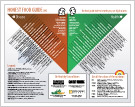
(Natural News) Nutrition, exercise and smoking are all considered primary modifiable risk factors for a wide array of health conditions. However, this leaves sleep and increasingly common sleep disorders often overlooked as risk factors. Sleep-disordered breathing – an umbrella term for several chronic conditions that involve the cessation of breathing throughout the night – affects more people than previously thought. Its most common type, obstructive sleep apnea, affects nearly 30 million adults in the US alone and could lead to oxidative stress and inflammation. Now, recent research suggests that sleep-disordered breathing could also cause rapid aging.
A study published in the journal Sleep found that increasing severity of sleep-disordered breathing and sleep disruption are linked with epigenetic age acceleration.
“People’s biological age might not be the same as their chronological age,” said lead author Xiaoyu Li. “Individuals whose biological age is higher than their chronological age exhibit age acceleration or fast aging. In our study, we found that more severe sleep-disordered breathing is associated with epigenetic age acceleration. Our data provide biological evidence supporting adverse physiological and health effects of untreated sleep-disordered breathing.” (Related: Trouble sleeping? Eat more fish — research suggests a connection between omega 3s and enhanced cognitive performance in school children via better sleep.)
Disrupted breathing can speed up aging
The authors of the study described epigenetic age acceleration as a DNA methylation-based marker of fast biological aging. This acceleration is also associated with different modifiable lifestyle factors. Although previous studies link sleep-disordered breathing with multiple age-related health disorders, its association with rapid aging has not been well-researched.
Sponsored: NEW Biostructured Silver First Aid Gel created by the Health Ranger combines three types of silver (ionic silver, colloidal silver, biostructured silver) with seven potent botanicals (rosemary, oregano, cinnamon and more) to create a breakthrough first aid silver gel. Over 50 ppm silver, verified via ICP-MS lab analysis. Made from 100% Texas rain water and 70% solar power. Zero chemical preservatives, fragrances or emulsifiers. See full details here.
To explore this association, researchers from the Harvard T.H. Chan School of Public Health analyzed the blood DNA methylation of 622 adults with a mean age of 69 years. They also evaluated each participants’ sleep at home via polysomnography. They estimated the associations of each sleep-disordered breathing trait with age acceleration through linear regression while controlling for socio-demographics, health behaviors, body mass index and study site.
The findings showed that a standard deviation increase in the apnea-hypopnea index, a measure of sleep-disordered breathing severity, was linked with a biological age acceleration of 215 days. On a similar note, each standard deviation increase in the arousal index, which is a measure of sleep disruption, was associated with 321 days worth of age acceleration.
Another surprising find was that these associations were also much stronger in women than in men. This suggests that, while women are often considered to be at lower risk for health outcomes related to sleep-disordered breathing, they may be particularly vulnerable to the negative health effects.
The researchers suggest that future studies on this topic should focus on whether treatment reduces epigenetic age acceleration among people who have sleep-disordered breathing.
“Since sleep-disordered breathing is not only common and treatable, but often undiagnosed and under-treated, our data highlight the potential for sleep-disordered breathing treatment to improve age-related chronic conditions and longevity,” said Li. “Because epigenetic changes are reversible, epigenetic age estimators may be useful for identifying and validating anti-aging interventions.”
Ways to treat sleep-disordered breathing
Standford Healthcare provides a few measures that can help treat sleep-disordered breathing. While these are not the be-all, end-all of treatment, each of them can still provide the necessary benefits that may improve your overall health.
- Avoiding alcohol and sedative medication. These factors impair your breathing during sleep by relaxing the muscles that support the airways, making it more likely to collapse. They also blunt the body’s reaction to low levels of oxygen.
- Weight loss. Studies often relate sleep-disordered breathing with obesity, meaning that losing some weight could bring about significant reductions or even eliminating the symptoms altogether. However, both dieting and losing weight could be difficult to perform due to the daytime fatigue that often accompanies various types of sleep-disordered breathing. So, consult your healthcare provider for supplementary treatments to help get you back in gear.
Learn more about sleep and the ways it could affect your health at Health.news.
Sources include:
















